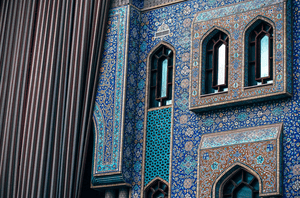To make the most of the blessed month of Ramaḍān, have a plan. Write down your daily schedule for Ramaḍān. Be happy and feel excited knowing that you will be spending quality time with Allah.
Depending on your circumstances, your schedule on weekdays may differ from the weekends. Aim to remain busy with good deeds, as having free time makes it easier to fall into sin.
What To Include in Your Timetable:
1. Salāh
• The 5 daily prayers, including the sunnah prayers. Be punctual with praying in congregation and aim to be there before the opening takbīr.
• Qiyām al-Layl (Tarāwīḥ/Tahajjud). Along with fasting, this is the highlight of Ramadān. This is the time of the year in which you can truly connect with the Qur’ān. Recite slowly, repeat the āyāt and feel the emotion in your heart. Think that Allah is talking to you directly.
• Salāh al-Ḍuḥā. This can be read approximately 15 minutes after sunrise till 15 minutes before Ẓuhr. The Messenger of Allah ﷺ said, “Whoever offers Fajr in congregation and remains seated, engaging in the remembrance of Allah until the sun has risen, and then offers two rakʿahs, he will have a reward equal to that of performing ḥajj and ʿumrah.” He ﷺ said: “Complete, complete, complete (i.e. complete reward)” (Tirmidhī).
• As many optional (nafl) prayers possible throughout the day and night.
2. Qur’ān
• Have an ambitious target for reciting as much Qur’ān as possible.
• Along with recitation, allocate time for memorising, reviewing memorisation, learning the meanings and reflecting on the Qur’ān.
• Bring the Qur’ān alive into your day. Have a minimum of at least one thing you will act upon based on what you recited in the day.
3. Dhikr
• Dhikr throughout the day and night
• Morning and evening adhkār
• Adhkār after ṣalāh
• Adhkār before sleep
• General dhikr throughout the day
• Spend time in acquainting yourself with the meanings of the adhkār (remembrances), so that your dhikr is conscious. Similarly, combine dhikr with deep reflection (tafakkur).
4. Duʿā’
• Duʿā’ before ifṭār
• Duʿā’ throughout the day when you’re fasting
• Duʿā’ in your sajdah
• Duʿā’ in the last third of the night
• Sunnah duʿās, such as before/after eating, entering/leaving the house, using the bathroom etc. Some of these have incredible rewards, which you shouldn’t miss out on, especially in this blessed month. (See ‘Daily Adhkar’ by Life With Allah)
• Increase your praise (ḥamd) of Allah at the start of your duʿā’. This will specifically help you to build a special bond with Him. (See ‘I Am Near’ by Life With Allah)
5. Helping Others & Family Ties
• Try to help others as much as possible, especially the elderly and vulnerable people of your community.
• Maintain family ties and reach out to people you may have cut off contact with.
• The most deserving of our good relations are our parents. We should serve and be kind to our parents to the best of our abilities.
• Choose specific acts of kindness which you will do for your family e.g. unload the dishwasher/give a head massage/help with homework.
• Give charity. Try to feed those who are fasting to acquire the reward of their fasts.
Use Every Moment
There may be times when you are tired or too exhausted to recite Qur’ān. Fill this time up with ‘easier’ acts of worship such as listening to the Qur’ān or a beneficial lecture. Similarly, if you’re doing household chores or commuting, recite the Qur’ān or do dhikr at the same time.
Have a stockpile of books, or even one book, ready to help you become close to Allah (ʿazza wa jall), His Words and His Messenger ﷺ.
Time to Detox
Ramaḍān is a month in which we attempt to train the nafs (inner self) to resist obeying its desires, and instead obey Allah (ʿazza wa jall). Therefore, it is essential, that along with planning what we are going to do in Ramaḍān, we should also plan what we are not going to do. Ramaḍān is a time to detox our bodies, and more importantly our hearts from the toxins of ‘sins’ and the ‘diseases’ of the heart.
If we fast – by not eating, drinking and abstaining from intimacy – but do not protect our eyes, ears and tongues from sinning, we will miss out on the essence and spirit of fasting.
The following are some of the key aspects we should focus on:
1) Eating
Food is the fuel of desires. The more we fill our stomachs, the lazier we feel to perform ʿibādah. If we eat a lot, we drink a lot. And this makes us sleep a lot, which leads to us losing out on precious time. The Prophet ﷺ ordered the unmarried companions to fast, because fasting is meant to curtail and restrain sexual desire.
Likewise, we have to internalise that Ramaḍān is about fasting, not feasting. We shouldn’t spend too much time preparing our meals. Naturally the long hours leave us hungry, making us want to cook more than usual. Similarly, we should not pressurise our family members to cook elaborate meals for us.
Imām al-Ghazalī (raḥimahullāh) explained that one will only reap the full benefit of a fast if one does not overeat at ifṭār. We should only eat what one would usually eat on a normal night. Otherwise, the purpose of fasting will not be fulfilled and it will be easier for Shayṭān to make inroads into our hearts.
2) Talking
Ramaḍān is the best time to rectify our speech. The Prophet ﷺ said, “Whoever believes in Allah and the Last Day, let him speak good or remain silent” (Bukhārī). This includes how we talk to others through our phones and on social media.
3) Sleeping
Ramaḍān is the best time to reduce sleep, and spend a greater portion of the night in worshipping Allah.
4) Socialising
Too much socialising hardens the heart, and often leads to sinning. Ramaḍān, especially iʿtikāf of the last 10 days is the perfect retreat: away from people, and fully focused on Allah.
May Allah al-Faṭṭāḥ (The Supreme Opener) open the paths of goodness and blessings for us in this month, and may He help us to utilise our time in the best way possible.
“By Allah, if it was said to the people of the grave, ‘make a wish!’ they would wish for one day of Ramaḍān.” – Ibn al-Jawzī (raḥimahullāh)






